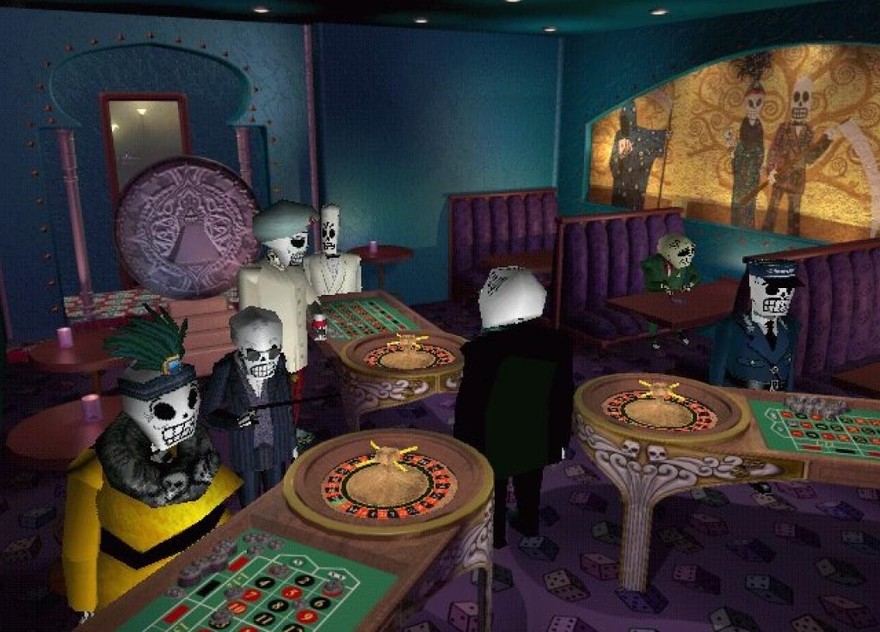Most game developers hire musicians who come and go. Rarely do composers stick around long enough to become the Bernard Herrmann to gaming’s Alfred Hitchcock, what Danny Elfman means to Tim Burton, or what John Williams is to the great Steven Spielberg.
“It’s like writing a novel versus writing a short story,” says Peter McConnell, who has created the music for every Tim Schafer game since Monkey Island 2: LeChuck’s Revenge in 1991—including legendary releases like Grim Fandango and Psychonauts. “You get a chance to really explore things in-depth and develop the character, which is your art or the art that you’re both doing.”
These sorts of long-term collaborations are unheard-of in games, where teams are assembled to complete a job and then disperse. Across seven projects, two studios, and almost a quarter-century, these two have forged an unbreakable artistic bond.
“It never seemed weird to me,” says McConnell. “It always felt kind of natural.”
McConnell recall his earliest impressions of Schafer: witty, funny, and laid back. A talented writer with a great sense of drama. They got along quickly—except for when McConnell got mad at him for trimming a cutscene in Maniac Mansion II: Day of the Tentacle. (“He just kind of looked at me,” says McConnell, laughing. “I always felt bad about that.”)
That was one of the only times they didn’t meet eye to eye. Schafer might correct him about a character’s personality, but he would never tell him what to fix in a theme. “What’s wonderful about working with Tim is that he’s very musically well versed, and a lot of times he knows exactly what he wants,” says McConnell. “He’s very low key about how he gets that across to me and kind of lets me run with the ball.
“So it’s more about what’s being communicated as opposed to the details of how to communicate it.”

On 1998’s Grim Fandango, McConnell and the sound department rounded up Schafer and coaxed him to talk about the game’s environments while Larry “the O” Oppenheimer played bongos and found the right vibes. They created what Schafer referred to as an interactive flow chart, where they could later replace his descriptions by plugging in the music for that room or area.
“It was a very improv, crazy, Bohemian thing, which fit because Grim had a lot of crazy Bohemian improv references in it,” says Schafer.
Schafer often steered McConnell in the direction of what he wanted from a score. He borrowed an Ecuadorian charango, an instrument made from the shell of an armadillo, from his brother to make some of the sounds in Grim Fandango. He also loaned McConnell all his film noir movies and a vinyl recording of Mexican folk music.
“The two couldn’t be more different,” says McConnell. “One was the big Hollywood film score sound, and the other was this really scritchy-scratchy bizarre music from the mountains of Mexico that no one’s ever heard. And Tim didn’t say, ‘I want you to do something like this.’ It was simply, ‘That’s what I want you to listen to.’”
Schafer had similar “listening lists” for other titles, like Brütal Legend, which married the orchestra and rock ’n roll in a natural way that McConnell is particularly proud of.
“It wasn’t probably something Peter did recreationally, so I would send him all my favorite Ozzy and Judas Priest and Iron Maiden records and have him listen to it,” says Schafer. “The thing I respect about Peter the most is that he doesn’t have this sovereignty about other types of music. He doesn’t think that other kinds of music besides the classical and traditional music that he likes are invalid because they’re low-brow. He just knows that there’s good heavy metal and there’s bad heavy metal and you can do anything well.”
The heavy metal Kabbage Boy song, “Girlfriend,” in the opening of Brütal Legend, is all McConnell’s work, Schafer says. They only like to pretend it’s a real band.
“I wrote the lyrics to the song, which is kind of a parody of something, like a cross between Fall Out Boy and Limp Bizkit and Linkin Park all put together,” says Schafer. “He somehow just spit that out. Like he spit out his own version of a Fall Out Boy song … and yet he’s a classical composer. So I really just respect [someone] who can just plow into any genre and figure out how to do it right.”
For Full Throttle in 1995, Schafer and McConnell sifted through big household names like The Velvet Underground and Soundgarden and listened to demos from local bands, but none of them sounded right for the game—until Keith Karloff of The Gone Jackals rode up on his Harley with a cassette tape in hand. Choosing a bigger artist could have been “a drop in the bucket financially for the game,” but McConnell says Tim’s choice was a testament to his ability “to see quality where it actually is.”
Brütal Legend, which came later in 2009, was much easier because Electronic Arts handled all the licensing, says Schafer. But he still remembers visiting with fancy record executives about music for Full Throttle and watching them do what McConnell called “comic book versions of intimidating”—like “the stuff that you’d see in Entourage or something,” adds Schafer.
“It was the most awkward meeting ever.”
These days, Schafer and McConnell don’t see each other as much. McConnell works from home, and Schafer’s normally locked in his room at the office, buried under a writing deadline. They meet a few times at the beginning of a project, but much of their correspondence happens through emails. That only works because they’ve known each other so long, says Schafer.

“I think because of the language that we can speak to each other, that shorthand of, ‘Hey, we need to do something that’s Mexican traditional but also film noir from ’30s, a little jazz swing to it.’ Being able to say that to somebody and have them be like, ‘You mean like this?’ And then play something that sounds exactly right, that’s just … You want to work with someone who gets what you’re trying to say and then brings a whole bunch more to it.”
They’ll spend a long time apart, he says, and then McConnell will show up at an office anniversary party, and they’ll talk the rest of the night about whether there’s a god—or the nature of good and evil, or other philosophical subjects that have nothing to do with the games they’re making. Those debates used to be conducted on their office couches; now they happen once every few years.
Broken Age, which Schafer says is one of his favorite scores, was a product of that physical distance. There was no listening list, no discussion about what sound Schafer wanted, and only minor feedback (Schafer didn’t want it to be too culturally specific—too “Renfaire” or modern). But to McConnell, it was also a throwback. Broken Age was so much “its own universe,” he says, that each area—from the lumberjack’s forest to Shellmound—became its own world musically.
“That was something that to me was reminiscent of the old LucasArts way of doing things,” he says. “Where each little world in an adventure game was its own little world, and you could go pretty far in some direction in that little world to really give the whole experience a lot of variety, as opposed to maybe a more cinematic approach where the whole thing sounds like one group playing one score.”
Variety is the rule that governs both McConnell’s music and Schafer’s storytelling. “I’m always tempted to do some crazy thing, do something that’s completely out of the box, that’s got nothing to do with what I just did just to keep my mind going on it,” says McConnell. “Just to stir things up in the middle of the score.
“I think we’re both comfortable with elements that are not something you’d normally think of together.”
The music and story mature together. One feeds into the other.
“Peter wants to understand the story,” says Schafer. “He really wants to understand what the themes of the story are and where the characters are going and where they came from … Because he wants to know how he should make it feel. So it’s not just scored to the action of the scene or scored to the location but scored to the emotional place of the characters.”

That passion is one of the reasons Schafer respects him. “He definitely does not let mediocrity lie. If something is bad or not working, if his music was put in the game and it was playing at the wrong speed or something, he would march upstairs and he wouldn’t let it go. And that’s important. It’s good for someone to be someone who stands up for quality.”
Likewise, Schafer’s vision is what keeps McConnell rooted to Double Fine when he’s never been held down before. He’s lived everywhere from Pittsburgh to Switzerland to Kentucky, places entrenched in musical culture. He’s played five-string banjo, trained classically in college, and toured with a goth band. Schafer’s approach to games—like picking out real Roma gypsy music to listen to when making Psychonauts—is proof of a mutually eclectic interest “in all kinds of cultures and all kinds of stories,” says McConnell.
“The entertainment industry in general is somewhat provincial,” he says. “You have to acknowledge that it’s located largely in one part of the world. It has a pretty consistent point of view and an experience that’s informed by being in places like L.A. and Seattle and New York, to a lesser degree. And that’s not the world. And the games business has been accused of taking a narrow view of the entertainment industry, which is already a narrow view. … There are a lot of games out there that look and sound like other games.
“But the Double Fines of the world are rare.”
Buy the Broken Age Soundtrack or download the Grim Fandango Soundtrack for free
